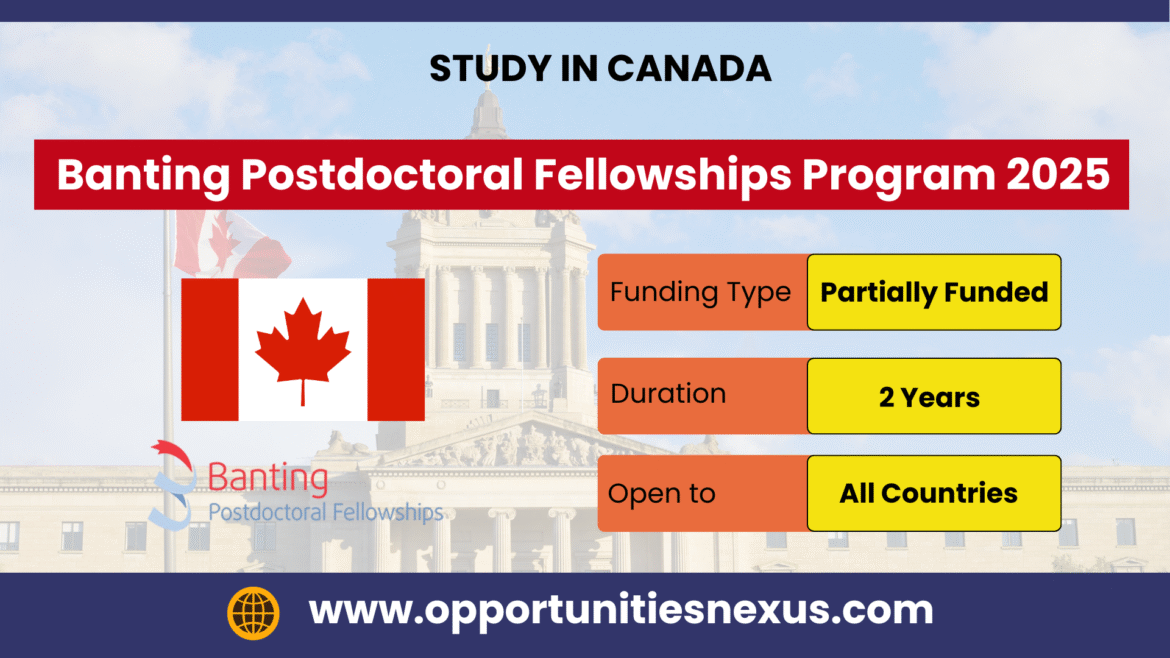What could a postdoc be if it were funded by one of the top programs in Canada? The Banting Postdoctoral Fellowships provide for exactly that – a rare chance for the best and brightest of you to conduct research that helps to shape a better future while accruing lasting benefits elsewhere in the academic, private and public sectors all the while ensuring that the longer term outcome proves beneficial to Canadian society and the world at large.
Designed to attract and retain the world’s most talented early-career researchers, the fellowship does more than provide funding for research; it champions leadership, collaboration, and research excellence. No matter where you’re from, if you want to further establish your postdoctoral research, the Banting Fellowship may be the next step for you.
Program Overview
| Attribute | Details |
|---|---|
| Provider | Government of Canada |
| Funding Agencies | CIHR, NSERC, SSHRC |
| Fellowship Value | CAD $70,000 per year (for 2 years) |
| Number of Awards | 70 annually |
| Duration | 2 years (non-renewable) |
| Location | Canadian and select international institutions |
| Eligible Nationalities | Canadian citizens, permanent residents, international applicants |
| Official Website | Banting Fellowship Website |
| Deadline | September 2024 (Institutional deadlines vary) |
Benefits:
- Generous Funding: With CAD $70,000 per year for two years, the fellowship enables researchers to focus full-time on their work without worrying about financial strain.
- Strategic Alignment: Applicants must demonstrate a strong fit with the host institution’s priorities. This alignment ensures institutional support and increases the likelihood of long-term impact.
- Prestige and Visibility: Being selected as a Banting Fellow signals exceptional promise. It opens doors in academia, government, and industry across Canada and internationally.
- Leadership Development: More than just research, the program emphasizes leadership and societal contributions. Fellows are expected to become change-makers within their fields.
- Interdisciplinary Reach: Whether you are in health, engineering, social sciences, or humanities, the Banting Fellowship fosters cross-disciplinary innovation.
Required Documents:
- Research Proposal (4 pages): Detailing objectives, significance, methodology, and expected impact.
- Special Significance of Research Environment (1 page): Explaining how the host institution aligns with your project.
- Banting CCV: A specific version of the Canadian Common CV.
- Letters of Reference (3): Strong letters that address leadership, innovation, and research excellence.
- Letter of Endorsement from Host Institution: A formal institutional commitment outlining support and alignment.
- Bibliography (up to 5 pages): Supporting literature related to your proposal.
- Leadership Contributions (1 page): Highlighting leadership outside academic achievements.
Eligibility Criteria:
- Doctoral Completion: You must have completed all requirements of your PhD or equivalent degree between September 15, 2021, and September 30, 2025 (inclusive).
- Citizenship: Open to Canadian and international scholars. However, Canadian citizens or permanent residents must hold their fellowship in Canada, while international applicants may hold it in Canada or abroad.
- Host Institution Agreement: Your host institution must agree to support and endorse your application.
- Non-renewability: The fellowship is non-renewable and cannot be held concurrently with another major federal fellowship.
How to Apply:
- Step 1: Identify a Host Institution: Start early by reaching out to institutions aligned with your research goals. Ensure they have the capacity to support your proposal and leadership development.
- Step 2: Develop Your Proposal: Collaborate closely with your proposed supervisor. Draft your 4-page research plan with clarity and strategic impact in mind.
- Step 3: Gather Supporting Documents: Prepare your Banting CV, letters of reference, and institutional letter of endorsement. Maintain tight coordination with all contributors.
- Step 4: Submit via ResearchNet: Use the ResearchNet platform to submit your complete application package.
- Step 5: Wait for Evaluation: Applications are evaluated based on: Research Excellence and Potential, Leadership in the Research Domain, Quality of Host Institution and Synergy
Application Deadline:
- Institutional Internal Deadline: Varies (often in August)
- Final Submission Deadline: September 2024
- Results Announcement: Spring 2025
Personal Insights & Tips:
- Strategic Match Matters: Don’t pick a host institution just for its reputation. Choose one that clearly aligns with your research and can demonstrate this in their endorsement.
- Start Early and Iterate: Give yourself at least 3-6 months to refine your proposal. Review it with mentors, colleagues, and potential referees.
- Use Metrics to Demonstrate Impact: Back up your leadership and research achievements with quantifiable outcomes (e.g., publications, patents, outreach).
- Craft a Visionary Proposal: Don’t just answer “what” and “how”—also answer “why now” and “why you”. Clearly explain your project’s relevance to Canada and beyond.
- Follow the Format Strictly: Page limits, font sizes, and file names are non-negotiable. Non-compliance can disqualify even stellar applications.

